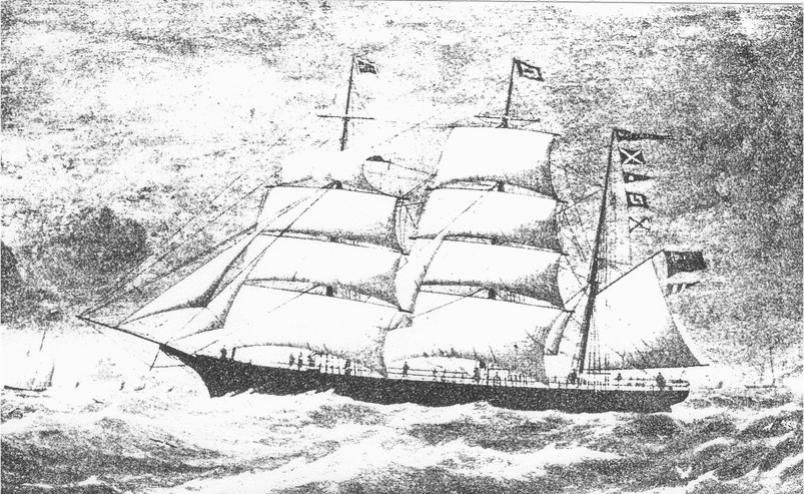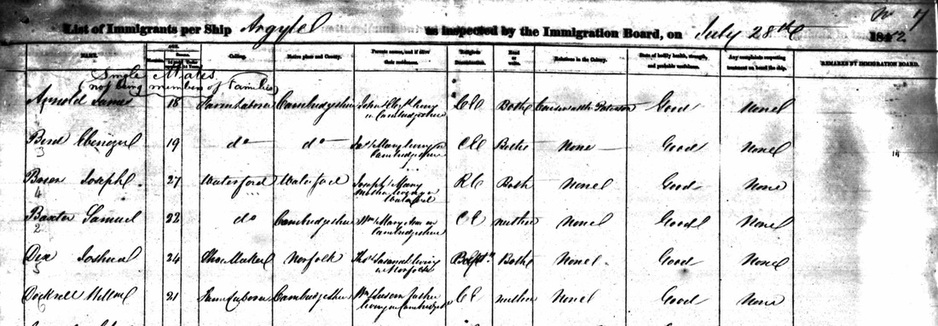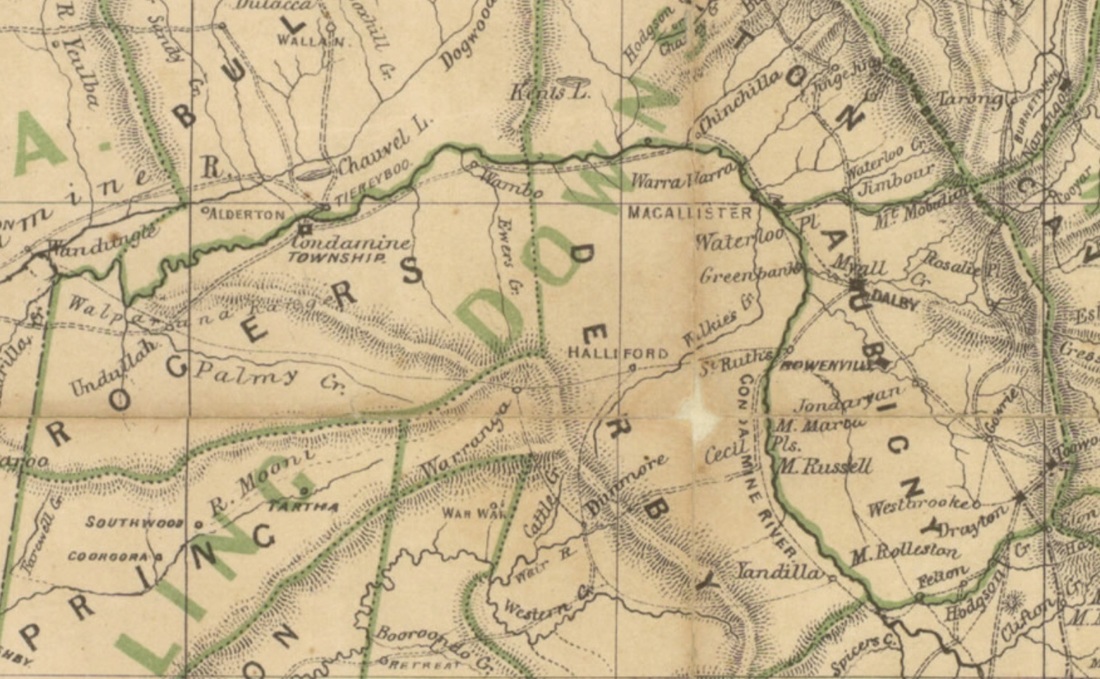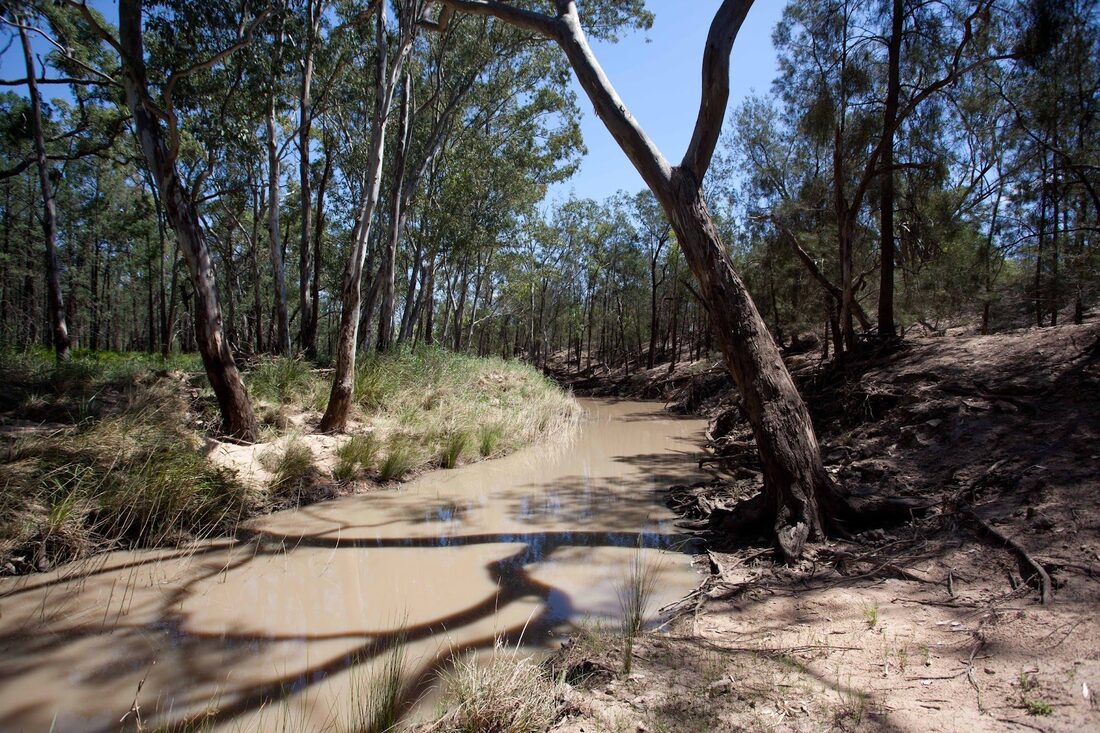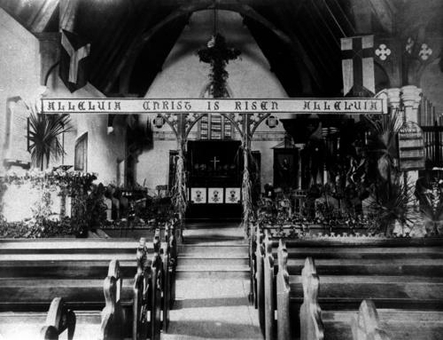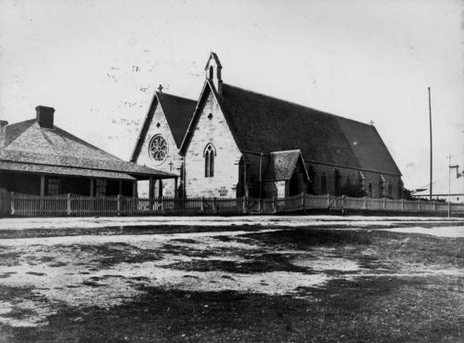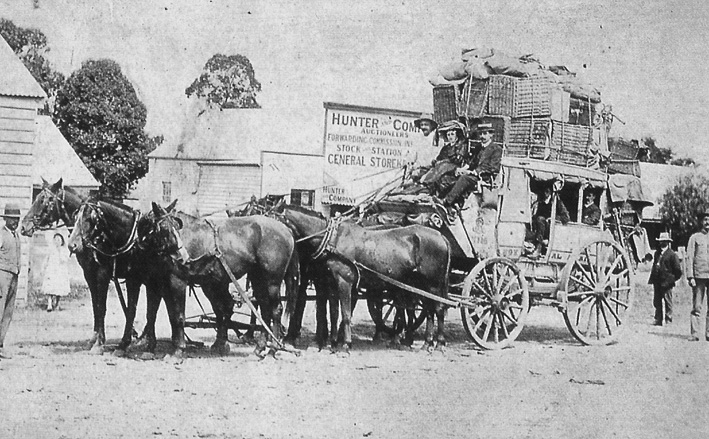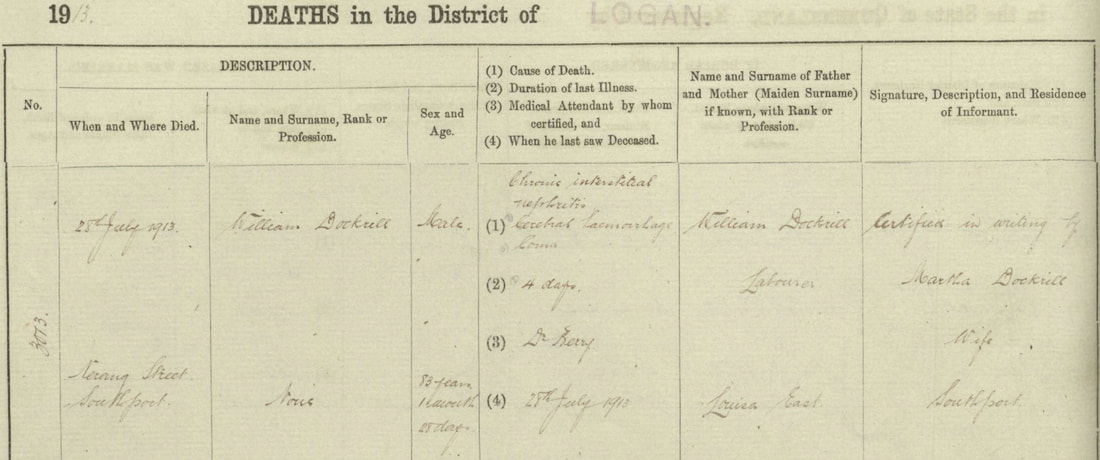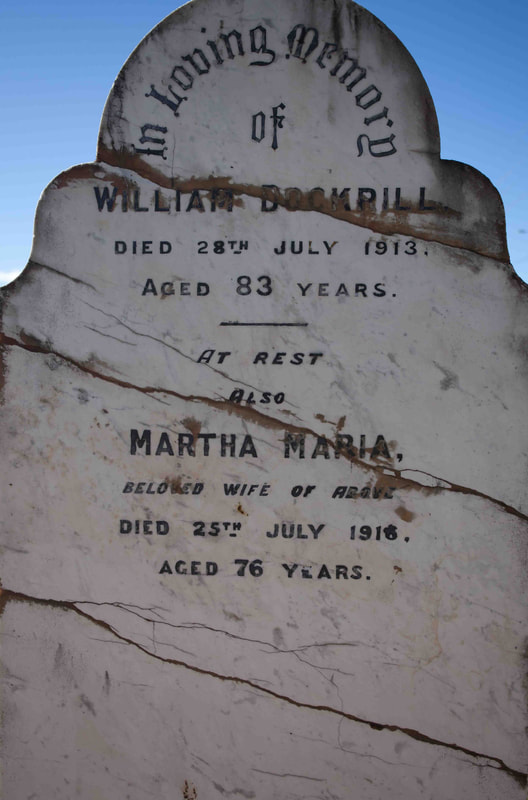The Argyle
William Dockrill 1830 - 1913
ON THIS PAGE - Major events in William Dockrill's life in chronological order.
SUBPAGES - Tartha; Martha Goss; Death of Amos Slight; Edwin Gransden
Links to other events and persons are included in the story below.
SUBPAGES - Tartha; Martha Goss; Death of Amos Slight; Edwin Gransden
Links to other events and persons are included in the story below.
1852 Argyle passenger list: bottom entry -" Dockrell William - 21- Farm Labourer - Cambridgeshire - C of E - illiterate."
17 Jul 1852 The arrival of the Argyle at Moreton Bay.
Aboard the Argyle was William Dockrill, a 21 year old farm labourer. William was born in Great Shelford, Cambridge. He was a 21 year-old farm labourer, single and could neither read nor write.
Amongst the immigrants were over 20 single men and 5 families from Cambridgeshire. William obtained work with Beck and Brown at Tartha station on the Moonie River. 3 years later, in 1855, Lewis James Eversden from Foxton married William's sister, Sophia, in Cambridge.
Also aboard the Argyle were Thomas Ivett (30) and his wife Charlotte (31) (nee Rider) and their 3 children. Charlotte was born in Great Shelford and was Jane Rider's aunt. The family lived in nearby Whittlesford prior to emigration.
In the 1850's, families living around the villages of Little Shelford, Great Shelford, Stapleford and surrounding areas had barely moved in the preceding 200 years and were well known to one another. These village bonds were maintained many years after emigration, no matter where the migrants settled, be it Chinchilla, Dalby, the Moonie River, Ipswich, Toowoomba or St Ruth. William Dockrill would have known the Ivetts very well, as would have his sister Sophia and her husband, Lewis Eversden.
Aboard the Argyle was William Dockrill, a 21 year old farm labourer. William was born in Great Shelford, Cambridge. He was a 21 year-old farm labourer, single and could neither read nor write.
Amongst the immigrants were over 20 single men and 5 families from Cambridgeshire. William obtained work with Beck and Brown at Tartha station on the Moonie River. 3 years later, in 1855, Lewis James Eversden from Foxton married William's sister, Sophia, in Cambridge.
Also aboard the Argyle were Thomas Ivett (30) and his wife Charlotte (31) (nee Rider) and their 3 children. Charlotte was born in Great Shelford and was Jane Rider's aunt. The family lived in nearby Whittlesford prior to emigration.
In the 1850's, families living around the villages of Little Shelford, Great Shelford, Stapleford and surrounding areas had barely moved in the preceding 200 years and were well known to one another. These village bonds were maintained many years after emigration, no matter where the migrants settled, be it Chinchilla, Dalby, the Moonie River, Ipswich, Toowoomba or St Ruth. William Dockrill would have known the Ivetts very well, as would have his sister Sophia and her husband, Lewis Eversden.
Mid-19th century map showing Tartha on the River Moonie
Note
1. Its relation to other places that feature in this story: Dalby, Macalister, Greenbank, Weranga, St Ruth, Myall Creek, Wilkie Creek.
2. The dotted line indicating the track from Weranga (spelt "Warranga") to Tartha on the Moonie.
Note
1. Its relation to other places that feature in this story: Dalby, Macalister, Greenbank, Weranga, St Ruth, Myall Creek, Wilkie Creek.
2. The dotted line indicating the track from Weranga (spelt "Warranga") to Tartha on the Moonie.
|
A Brief History of Tartha
Tartha, lower down the Moonie, was taken up in 1852 by Beck and Brown. It consisted of 1100 square miles of country on the creeks falling into the Moonie, but being isolated, no neighbours were nearer than 100 miles, with wages high and labour scarce, it was not occupied for some years. The name Tartha was given by the blacks. When it was eventually occupied it was divided into Canmaroo, Coomrith, North Ingleston and Cooroora. Tartha was sold in 1860 to W. L. Nelson, father of Sir Hugh Nelson, but Brown repurchased it in 1862. He afterwards sold it to William Dockrill, who for years had been in his employ. In March, 1862, Beck and Brown dissolved partnership, Beck taking Canmaroo, and Brown Coomrith selling part of it in 1873 to the Hon. William Graham and Daniel Williams. |
2015 The Moonie River at Tartha
|
Comment
William Dockrill probably purchased Tartha between 1864 and 1868. He added progressively to his holdings. Today's property boundaries bear little resemblance to those of 1860.
William Dockrill probably purchased Tartha between 1864 and 1868. He added progressively to his holdings. Today's property boundaries bear little resemblance to those of 1860.
19th Century Tartha map
Note:
1. The station downstream of the junction of the Moonie and Toombilla Creek
2. The general overview of Tartha.
3. Comments on the map zoomed in on the station regarding fencing, property boundary lengths and timber.
Note:
1. The station downstream of the junction of the Moonie and Toombilla Creek
2. The general overview of Tartha.
3. Comments on the map zoomed in on the station regarding fencing, property boundary lengths and timber.
1860's : Newspaper clippings regarding Tartha.
1864 The Arrival of the Eversdens
In early 1864, Lewis James Eversden and his surviving child Clara, arrived at Tartha. It is possible Eversden's arrival facilitated the purchase of Tartha. Eversden carried out the role of "storeman" for Dockrill. His ability to read and write, knowledge of the law, and general organisational skills, appear to have complemented the instinctive, forthright and often brusque manner of Dockrill.
It is unlikely that Dockrill and Eversden were firmly acquainted prior to 1864, as it was only in 1855, 3 years after Dockrill arrived in Australia, that Eversden married Sophia Dockrill, William's younger sister by 6 years.
Lewis Eversden worked at Tartha until 1886, a period of 22 years - such a long time in so remote a location that one suspects he had a financial stake in the property. It is possible that his eventual "escape" from Tartha was facilitated by his business dealings with Donald McLaran.
In early 1864, Lewis James Eversden and his surviving child Clara, arrived at Tartha. It is possible Eversden's arrival facilitated the purchase of Tartha. Eversden carried out the role of "storeman" for Dockrill. His ability to read and write, knowledge of the law, and general organisational skills, appear to have complemented the instinctive, forthright and often brusque manner of Dockrill.
It is unlikely that Dockrill and Eversden were firmly acquainted prior to 1864, as it was only in 1855, 3 years after Dockrill arrived in Australia, that Eversden married Sophia Dockrill, William's younger sister by 6 years.
Lewis Eversden worked at Tartha until 1886, a period of 22 years - such a long time in so remote a location that one suspects he had a financial stake in the property. It is possible that his eventual "escape" from Tartha was facilitated by his business dealings with Donald McLaran.
13 Dec 1866 Dockrill – Slight marriage
William Dockrill and Martha Slight (nee Goss) married in St John’s Church (since demolished, located in todays Queen's Park, North Quay) in December 1866, less than 3 months after the death of Amos Slight.
Comment
One wonders at the speed with which William Dockrill managed to marry the widowed Martha Slight. The very precise Clara Eversden stated in 1916 that she had known Martha for 52 years. This confirms that the Slights were working at Tartha in 1864 when the Eversdens arrived.
The distance and the slow mails to Tartha and the speediness of the marriage suggest that William Dockrill was a decisive person (or there was communication by telegraph) and that Martha had few options available to her. Henry Bus(c)h, a witness at the Amos Slight inquest, and his future wife, Mary Prout, were witnesses to the marriage.
William Dockrill and Martha Slight (nee Goss) married in St John’s Church (since demolished, located in todays Queen's Park, North Quay) in December 1866, less than 3 months after the death of Amos Slight.
Comment
One wonders at the speed with which William Dockrill managed to marry the widowed Martha Slight. The very precise Clara Eversden stated in 1916 that she had known Martha for 52 years. This confirms that the Slights were working at Tartha in 1864 when the Eversdens arrived.
The distance and the slow mails to Tartha and the speediness of the marriage suggest that William Dockrill was a decisive person (or there was communication by telegraph) and that Martha had few options available to her. Henry Bus(c)h, a witness at the Amos Slight inquest, and his future wife, Mary Prout, were witnesses to the marriage.
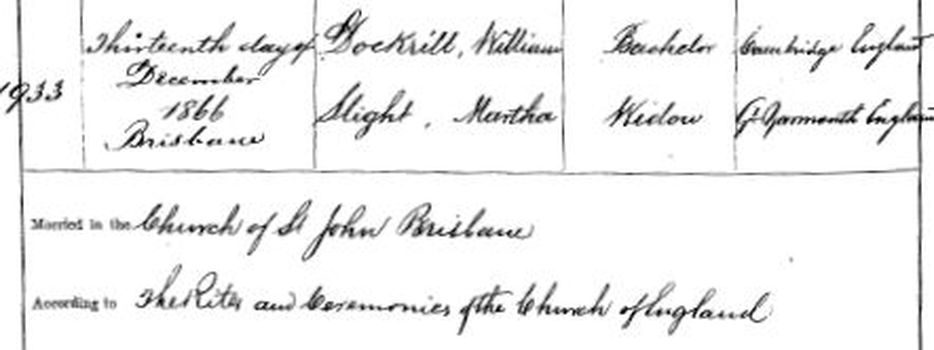
1866 Part of Dockrill - Slight wedding certificate
Nov 1871 William Dockrill summoned to court.
2 Nov 1871 Queensland Times
SURAT. I forgot to say that Mr. Dockerill's sheep - 4000 in number, from Tartha, the neighbouring station to Mr. Langhorne, of Cooroora - are expected shortly at Surat, Mr. Dockerill having received a pressing invitation from Mr. Brown, of Coomrith, to sport his figure at the Surat Court on the 2nd November. I don't think he will stop long at Surat, as the reserve is eaten quite bare by the Cooroora and Talavern pirates.
14 Nov 1871 EXTRACT From Queensland Times
3 Nov 1871 SURAT. FROM OUR OWN CORRESPONDENT.
We had a great gathering here at the Court of Petty Sessions, held on the 2nd. There was a fair amount of "pulling" done, and I am happy to say that two parties who are wandering about with travelling sheep levying on everybody's grass, were fined for trespass - one in £2 and £4 10s. 6d. the other Mr. J. Sproat, being recommended to mercy by Mr. Ross, in 5s. fine and 18s. expenses.
The following is a list of the cases heard on Tuesday, 2nd November, before Mr. H. E. Buttanshaw, P.M., and Mr. F. B. Bays, J.P.:
- William Dockerill charged by Mr. S. Brown, of Coomrith, with not going his distance with travelling sheep; fined £2 and £4 11s. 6d. costs, including costs of Court.
- Marriott Brown V. Lewis Eversden. Trespass with travelling sheep. Case dismissed.
2 Nov 1871 Queensland Times
SURAT. I forgot to say that Mr. Dockerill's sheep - 4000 in number, from Tartha, the neighbouring station to Mr. Langhorne, of Cooroora - are expected shortly at Surat, Mr. Dockerill having received a pressing invitation from Mr. Brown, of Coomrith, to sport his figure at the Surat Court on the 2nd November. I don't think he will stop long at Surat, as the reserve is eaten quite bare by the Cooroora and Talavern pirates.
14 Nov 1871 EXTRACT From Queensland Times
3 Nov 1871 SURAT. FROM OUR OWN CORRESPONDENT.
We had a great gathering here at the Court of Petty Sessions, held on the 2nd. There was a fair amount of "pulling" done, and I am happy to say that two parties who are wandering about with travelling sheep levying on everybody's grass, were fined for trespass - one in £2 and £4 10s. 6d. the other Mr. J. Sproat, being recommended to mercy by Mr. Ross, in 5s. fine and 18s. expenses.
The following is a list of the cases heard on Tuesday, 2nd November, before Mr. H. E. Buttanshaw, P.M., and Mr. F. B. Bays, J.P.:
- William Dockerill charged by Mr. S. Brown, of Coomrith, with not going his distance with travelling sheep; fined £2 and £4 11s. 6d. costs, including costs of Court.
- Marriott Brown V. Lewis Eversden. Trespass with travelling sheep. Case dismissed.
19 Feb 1872 William and Martha Dockrill adopted a son.
After 7 years of marriage, William Dockrill travelled to The Lady Bowen Orphanage in Brisbane and adopted Edwin James Gransden. There was no blood connection between the Dockrill and Gransden families, but a small village named Gransden is located west of Cambridge and the lad's name may have influenced William Dockrill in his selection.
Edwin Gransden spent over 25 years working at Tartha before joining Queensland Railways as a porter. He married in May 1893 but the union produced no issue. Late in life he won many horticultural prizes, reflecting the talents of his adopted uncle, Lewis Eversden, with whom he spent many formative years at Tartha.
After 7 years of marriage, William Dockrill travelled to The Lady Bowen Orphanage in Brisbane and adopted Edwin James Gransden. There was no blood connection between the Dockrill and Gransden families, but a small village named Gransden is located west of Cambridge and the lad's name may have influenced William Dockrill in his selection.
Edwin Gransden spent over 25 years working at Tartha before joining Queensland Railways as a porter. He married in May 1893 but the union produced no issue. Late in life he won many horticultural prizes, reflecting the talents of his adopted uncle, Lewis Eversden, with whom he spent many formative years at Tartha.
1872 Family Members living at Tartha.
In 1872, residing at Tartha were William (42) and Martha Dockrill (33), their adopted son Edwin Gransden (8), Lewis James Eversden (37) and his daughter Clara Eversden (16). Shortly after in 1873, Clara's personal cattle brand was registered.
In 1872, residing at Tartha were William (42) and Martha Dockrill (33), their adopted son Edwin Gransden (8), Lewis James Eversden (37) and his daughter Clara Eversden (16). Shortly after in 1873, Clara's personal cattle brand was registered.
Slide 1: 1873 Clara Eversden's registered cattle brand.
Slide 2: 1876 Advertisement referring to Clara's brand.
Slide 2: 1876 Advertisement referring to Clara's brand.
1874 William Dockrill clashed with a policeman.
16 May 1874 Darling Downs Gazette
Barber, another police-constable, was charged with an aggravated assault on Mr Dockerill, of Tartha Station. It appeared that the accused insisted on his right to put his horse into a small paddock of Mr Dockerill's, which was reserved exclusively for a small flock of rams. Mr Dockerill refused to allow him to do so, words ensued, and the prosecutor alleged that accused felled him to the ground with a heavy riding whip. The jury found a verdict of not guilty.
Comment
This incident appears to have coloured William Dockrill’s opinion of all policemen. He did not forgive or forget and he had some measure of revenge 13 years later. A more comprehensive account is included with Donald McLaran's appearance in court on the same day.
16 May 1874 Darling Downs Gazette
Barber, another police-constable, was charged with an aggravated assault on Mr Dockerill, of Tartha Station. It appeared that the accused insisted on his right to put his horse into a small paddock of Mr Dockerill's, which was reserved exclusively for a small flock of rams. Mr Dockerill refused to allow him to do so, words ensued, and the prosecutor alleged that accused felled him to the ground with a heavy riding whip. The jury found a verdict of not guilty.
Comment
This incident appears to have coloured William Dockrill’s opinion of all policemen. He did not forgive or forget and he had some measure of revenge 13 years later. A more comprehensive account is included with Donald McLaran's appearance in court on the same day.
Sep 1874 William Dockrill in court to answer employee claim for wages.
5 Sep 1874 Dalby Herald
DALBY POLICE COURT. Tuesday September 1: Before the Police Magistrate and Mr. Skelton, claim for wages
Robert Brody summoned Mr. W. Dockrill, of Tartha, for £17/16/- wages due to him as shepherd. The complainant deposed that he engaged with Mr. Dockrill as shepherd, on March 20th, by verbal agreement, at the rate of £45 per annum, with rations; either party was at liberty to terminate the engagement, on giving the other notice; on Aug. 6th complainant gave defendant notice that he would leave in a week; defendant wished him to stay, as he had not time to get another man to take charge of the sheep; the overseer came to witness's hut, and witness told him he would bring out the sheep on Monday; the overseer told him not to do that if he was leaving on the Tuesday; witness went to the head station and saw Mr. Dockrill, and asked him to settle; he said no, as witness had been with him all the winter, he might stay till the lambing; defendant never mentioned the lambing before; he refused to settle and witness asked him several times if defendant owes witness £17/16/-, but the amount of some stores which witness had will have to be deducted.
By Mr. Chubb: Mr. Dockrill did not read over any agreement when I engaged with him and no mention was made of £37 per annum or £45 if I stayed to the lambing; it was on the Saturday I told the overseer that I should leave and when I saw Mr. Dockrill at the head station, he found fault about some sheep that were lost, and at my not having skinned some dead ones; I told him I should leave; from the time of my giving notice until I left was 6 days and when I engaged with Mr. Dockrill, nothing was said about my staying until he got another man, nor about the time for giving notice; I have had no employment since I left Mr. Dockrill.
Wm. Dockrill, of Tartha, deposed: I engaged the complainant as shepherd on March 29, at £37 per annum, and if he stayed until the lambing, he was to receive £15 per annum; the agreement produced was read over to him by the overseer, in my presence and he made no objection; complainant never signed any agreement, but he consented to the conditions; on the 14th of August I counted the sheep, and 115 were missing; complainant asked me to get a man to take the sheep; I said I had no time to get any one to take them; on the 18th August he left the sheep and between the 24th and 30th August, 110 got away; when he came to me at the head station, I asked him where the sheep were: he said "I left them In the yard," and asked for his cheque and I said I would go to Dalby and get a summons for him and I had no one on the station except the overseer; I afterwards found a number of sheep dead in the bush; when the agreement was made, complainant said he would stay until I could suit myself with a man; the charges in the account for stores are those usual on stations; as the lambing has not yet commenced at Tartha.
By Mr. Harris: The form of agreement was written by my overseer. By the time when the agreement was read, it was read as if the blanks were filled in. Mr. Chubb said the complainant was entitled to leave the service, but he should have given reasonable notice to defendant to enable him to supply complainant’s place, and it would be for the best to determine whether he had done so.
The Bench said that the overseer, to whom the complainant might have given notice, was not present, he might have received the notice, and failed to inform Mr. Dockrill; there was no mention of lambing in the agreement. Verdict for plaintiff for the amount claimed, less the store account. The Bench refused to allow costs to plaintiff, as he had left Mr. Dockrill in circumstances of great difficulty.
5 Sep 1874 Dalby Herald
DALBY POLICE COURT. Tuesday September 1: Before the Police Magistrate and Mr. Skelton, claim for wages
Robert Brody summoned Mr. W. Dockrill, of Tartha, for £17/16/- wages due to him as shepherd. The complainant deposed that he engaged with Mr. Dockrill as shepherd, on March 20th, by verbal agreement, at the rate of £45 per annum, with rations; either party was at liberty to terminate the engagement, on giving the other notice; on Aug. 6th complainant gave defendant notice that he would leave in a week; defendant wished him to stay, as he had not time to get another man to take charge of the sheep; the overseer came to witness's hut, and witness told him he would bring out the sheep on Monday; the overseer told him not to do that if he was leaving on the Tuesday; witness went to the head station and saw Mr. Dockrill, and asked him to settle; he said no, as witness had been with him all the winter, he might stay till the lambing; defendant never mentioned the lambing before; he refused to settle and witness asked him several times if defendant owes witness £17/16/-, but the amount of some stores which witness had will have to be deducted.
By Mr. Chubb: Mr. Dockrill did not read over any agreement when I engaged with him and no mention was made of £37 per annum or £45 if I stayed to the lambing; it was on the Saturday I told the overseer that I should leave and when I saw Mr. Dockrill at the head station, he found fault about some sheep that were lost, and at my not having skinned some dead ones; I told him I should leave; from the time of my giving notice until I left was 6 days and when I engaged with Mr. Dockrill, nothing was said about my staying until he got another man, nor about the time for giving notice; I have had no employment since I left Mr. Dockrill.
Wm. Dockrill, of Tartha, deposed: I engaged the complainant as shepherd on March 29, at £37 per annum, and if he stayed until the lambing, he was to receive £15 per annum; the agreement produced was read over to him by the overseer, in my presence and he made no objection; complainant never signed any agreement, but he consented to the conditions; on the 14th of August I counted the sheep, and 115 were missing; complainant asked me to get a man to take the sheep; I said I had no time to get any one to take them; on the 18th August he left the sheep and between the 24th and 30th August, 110 got away; when he came to me at the head station, I asked him where the sheep were: he said "I left them In the yard," and asked for his cheque and I said I would go to Dalby and get a summons for him and I had no one on the station except the overseer; I afterwards found a number of sheep dead in the bush; when the agreement was made, complainant said he would stay until I could suit myself with a man; the charges in the account for stores are those usual on stations; as the lambing has not yet commenced at Tartha.
By Mr. Harris: The form of agreement was written by my overseer. By the time when the agreement was read, it was read as if the blanks were filled in. Mr. Chubb said the complainant was entitled to leave the service, but he should have given reasonable notice to defendant to enable him to supply complainant’s place, and it would be for the best to determine whether he had done so.
The Bench said that the overseer, to whom the complainant might have given notice, was not present, he might have received the notice, and failed to inform Mr. Dockrill; there was no mention of lambing in the agreement. Verdict for plaintiff for the amount claimed, less the store account. The Bench refused to allow costs to plaintiff, as he had left Mr. Dockrill in circumstances of great difficulty.
Jan 1878 William Dockrill's 1800 sheep return to Tartha from Blaxland's
Jan 1876 The Queenslander
The following stock have crossed the reserve, 1800, the property of Mr. Dockerill, from Blaxland's, en route (after having been shorn) to Tartha, on the Moonie, and several small lots belonging to local owners.
Comment
Blaxlands is located at 3 Mile Scub east of Dalby on the railway line. It became a shearing and boiling down centre and was eventually owned by John Nicholson – see 1900 marriage of Sophia McLaran. The complex was under construction at the time of Jane McLaran's drowning in Myall Creek.
Jan 1876 The Queenslander
The following stock have crossed the reserve, 1800, the property of Mr. Dockerill, from Blaxland's, en route (after having been shorn) to Tartha, on the Moonie, and several small lots belonging to local owners.
Comment
Blaxlands is located at 3 Mile Scub east of Dalby on the railway line. It became a shearing and boiling down centre and was eventually owned by John Nicholson – see 1900 marriage of Sophia McLaran. The complex was under construction at the time of Jane McLaran's drowning in Myall Creek.
1880 Family Members living at Tartha
In 1880, residing at Tartha were William (50) and Martha Dockrill (41), their adopted son Edwin Gransden (16), Lewis James Eversden (45) and his second wife, Jane (formerly Brown, nee Rider) (43), and possibly Jane's children Isabella (22), Susan (16) and William (7). The family group had grown after losing Clara Eversden in 1879 when she married Donald McLaran and afterwards lived in Dalby.
Isabella and Susan Brown would have departed Tartha (if they ever lived there) when they married in 1883 and 1884. In 1886, Lewis and Jane Eversden and son William left Tartha to live in Southport.
In 1880, residing at Tartha were William (50) and Martha Dockrill (41), their adopted son Edwin Gransden (16), Lewis James Eversden (45) and his second wife, Jane (formerly Brown, nee Rider) (43), and possibly Jane's children Isabella (22), Susan (16) and William (7). The family group had grown after losing Clara Eversden in 1879 when she married Donald McLaran and afterwards lived in Dalby.
Isabella and Susan Brown would have departed Tartha (if they ever lived there) when they married in 1883 and 1884. In 1886, Lewis and Jane Eversden and son William left Tartha to live in Southport.
|
Mar 1883 Humour on the Moonie coach catches a New Chum unaware.
20 Mar 1883 The Brisbane Courier THE Dalby Herald vouches for the following: As the Moonie coach was proceeding to Southwood last week, driven, by the well-known whip Peter Smith, seated by his side on the box was a new chum, who, not being accustomed to the wilds and deserts of the Moonie, was rather inquisitive. Between Southwood and Tartha, a large marsupial was seen bounding up to the coach and instantly stopped, and Smith, rising from his seat, exclaimed, "Nothing for your station today, sir!" Whereupon the marsupial turned round and darted through the bush. The new chum, being rather astonished, demanded an explanation, and Smith informed him that kangaroos were trained in that part of the country to convey intelligence to and from the mail coach. |
Mar 1887 William Dockrill had some revenge on the constabulary
28 March 1887 Brisbane Courier
At the Police Court yesterday, before Mr. P. Pinnock, P.M., and Mr. A. S. Leslie, J.P., William Dockerill, a middle-aged man, appeared on remand in answer to a charge of destroying a helmet belonging to Constable Burke by throwing it out of a railway carriage between Laidley and Gatton. Mr. Baxter Bruce appeared for the defendant.
The evidence of Constable Burke went to show that he was returning to Brisbane by train, and after leaving Laidley the only other occupants of the carriage were the defendant and a lad named Smith. He had laid his helmet on the opposite seat near defendant's swag, but presently, thinking it would be in defendant's way, he got up to move it. Defendant had then moved his position and the helmet had disappeared. He asked defendant what he had done with his helmet, and defendant replied that he had "done a constable before now." He then took him into custody and brought him to Brisbane.
Mr. Bruce elicited in cross-examination that the constable had handcuffed the defendant, and although he admitted that his conduct was not violent on reaching Brisbane, he kept the handcuffs on him till he reached the lockup. At this stage Mr. Pinnock said that he must at once discharge the defendant, as there was no case against him, nor did he wish to hear any more evidence, as Mr. Bruce had intimated that the matter would not rest there. If an inquiry were ordered it would probably be conducted by himself (Mr. Pinnock), and he wished to keep his mind quite unbiased.
Same incident, different report:
A curious case came before Mr. Pinnock, at the Brisbane Police Court, on Wednesday last. It appears that Constable Burke was a passenger by train to Brisbane some days previously. He placed his helmet on a seat near another passenger, and, soon after leaving Laidley, he missed his headgear. He interrogated defendant, whose only reply was that he had "done a constable before now." Burke thereupon arrested him, and, although he was not violent, marched him to the Brisbane lockup with handcuffs on. The defendant, whose name turns out to be Dockrill, is one of the oldest squatters on the Darling Downs; and an inquiry will probably be held.
Comment
It is reasonable to suspect William Dockrill’s actions on the train stemed from his assault by a policeman on 16 May 1874, where it appears he was unjustly treated in a court of law.
28 March 1887 Brisbane Courier
At the Police Court yesterday, before Mr. P. Pinnock, P.M., and Mr. A. S. Leslie, J.P., William Dockerill, a middle-aged man, appeared on remand in answer to a charge of destroying a helmet belonging to Constable Burke by throwing it out of a railway carriage between Laidley and Gatton. Mr. Baxter Bruce appeared for the defendant.
The evidence of Constable Burke went to show that he was returning to Brisbane by train, and after leaving Laidley the only other occupants of the carriage were the defendant and a lad named Smith. He had laid his helmet on the opposite seat near defendant's swag, but presently, thinking it would be in defendant's way, he got up to move it. Defendant had then moved his position and the helmet had disappeared. He asked defendant what he had done with his helmet, and defendant replied that he had "done a constable before now." He then took him into custody and brought him to Brisbane.
Mr. Bruce elicited in cross-examination that the constable had handcuffed the defendant, and although he admitted that his conduct was not violent on reaching Brisbane, he kept the handcuffs on him till he reached the lockup. At this stage Mr. Pinnock said that he must at once discharge the defendant, as there was no case against him, nor did he wish to hear any more evidence, as Mr. Bruce had intimated that the matter would not rest there. If an inquiry were ordered it would probably be conducted by himself (Mr. Pinnock), and he wished to keep his mind quite unbiased.
Same incident, different report:
A curious case came before Mr. Pinnock, at the Brisbane Police Court, on Wednesday last. It appears that Constable Burke was a passenger by train to Brisbane some days previously. He placed his helmet on a seat near another passenger, and, soon after leaving Laidley, he missed his headgear. He interrogated defendant, whose only reply was that he had "done a constable before now." Burke thereupon arrested him, and, although he was not violent, marched him to the Brisbane lockup with handcuffs on. The defendant, whose name turns out to be Dockrill, is one of the oldest squatters on the Darling Downs; and an inquiry will probably be held.
Comment
It is reasonable to suspect William Dockrill’s actions on the train stemed from his assault by a policeman on 16 May 1874, where it appears he was unjustly treated in a court of law.
1913 Part of William Dockrill's death certificate
|
28 Jul 1913 Death of William Dockrill at Southport
29 Jul 1913 Brisbane Courier The Friends of Mr. W. DOCKRILL, deceased, late of Tartha Station, Moonie River, are respectfully invited to attend his Funeral, to move from his late residence, Nerang Street, Southport, at 3 o'clock THIS DAY (Tuesday). This funeral notice is all that was written about the life and death of the very first immigrant in this family to arrive at Moreton Bay. |
Southport Cemetery - William Dockrill and Martha Goss headstone
|
A more fitting obituary may have been written along these lines:
William Dockrill passed away at his home, Heron Cottage, in Nerang Street, Southport on 28 July. Born at Great Shelford, Cambridgeshire in 1830, Mr Dockrill is survived by his wife, Martha, and their adopted son, Edwin Gransden of Brisbane, and his only blood relation in Australia, his niece, Clara McLaran of Dalby.
Mr Dockrill arrived in this country aboard the Argyll in 1852 and spent the next 47 years of his life as a grazier at Tartha on the Moonie River. He purchased the property around 1864 - 1866 from Beck and Brown for whom he had worked since his arrival in the colony. His brother-in-law Mr Lewis Eversden and his daughter Miss Clara Eversden joined him in trying circumstances at Tartha in 1864. Mr Eversden worked faithfully for Mr Dockrill as manager and storeman for 22 years before he retired to Southport.
Mr Dockrill expanded his interests in 1887 with the purchase of the adjoining property, Haran, from Clara’s husband Mr Donald McLaran. He held the properties until 1899 when he retired to Southport for a well-earned rest.
At Tartha, Mr Dockrill raised large numbers of sheep, cattle and horses. He employed shepherds, drovers and labourers to run his vast and isolated station. Though his literary abilities were limited - he relied upon Mr Eversden for many administrative aspects of his business – he was an extremely astute businessman and capably navigated the complex issues of land ownership. He was a tough employer but rebelled against authority himself, sometimes to his detriment.
In 1866 Mr Dockrill married Mrs Martha Slight, a widow of a former Tartha employee. There were no children from their marriage and in 1871 the Dockrills adopted seven year old Edwin Gransden from the Diamantina Orphanage.
William Dockrill’s achievements in “the unsettled area” of the Moonie were remarkable, considering his lack of education and financial backing. His perseverance over almost 50 years in remote marginal grazing country, through floods and droughts, has to be admired. William Dockrill left no direct descendants, but his lasting legacy is the name of the parish (spelt "Dockerill") which adjoins Tartha.
William Dockrill passed away at his home, Heron Cottage, in Nerang Street, Southport on 28 July. Born at Great Shelford, Cambridgeshire in 1830, Mr Dockrill is survived by his wife, Martha, and their adopted son, Edwin Gransden of Brisbane, and his only blood relation in Australia, his niece, Clara McLaran of Dalby.
Mr Dockrill arrived in this country aboard the Argyll in 1852 and spent the next 47 years of his life as a grazier at Tartha on the Moonie River. He purchased the property around 1864 - 1866 from Beck and Brown for whom he had worked since his arrival in the colony. His brother-in-law Mr Lewis Eversden and his daughter Miss Clara Eversden joined him in trying circumstances at Tartha in 1864. Mr Eversden worked faithfully for Mr Dockrill as manager and storeman for 22 years before he retired to Southport.
Mr Dockrill expanded his interests in 1887 with the purchase of the adjoining property, Haran, from Clara’s husband Mr Donald McLaran. He held the properties until 1899 when he retired to Southport for a well-earned rest.
At Tartha, Mr Dockrill raised large numbers of sheep, cattle and horses. He employed shepherds, drovers and labourers to run his vast and isolated station. Though his literary abilities were limited - he relied upon Mr Eversden for many administrative aspects of his business – he was an extremely astute businessman and capably navigated the complex issues of land ownership. He was a tough employer but rebelled against authority himself, sometimes to his detriment.
In 1866 Mr Dockrill married Mrs Martha Slight, a widow of a former Tartha employee. There were no children from their marriage and in 1871 the Dockrills adopted seven year old Edwin Gransden from the Diamantina Orphanage.
William Dockrill’s achievements in “the unsettled area” of the Moonie were remarkable, considering his lack of education and financial backing. His perseverance over almost 50 years in remote marginal grazing country, through floods and droughts, has to be admired. William Dockrill left no direct descendants, but his lasting legacy is the name of the parish (spelt "Dockerill") which adjoins Tartha.
